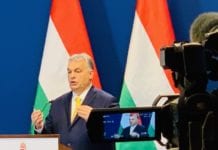<Pope was known as voice for persecuted Christians
<Future of church remains uncertain
By Stefan J. Bos, Chief International Correspondent BosNewsLife with additional reporting from Vatican and BosNewsLife Research

VATICAN CITY (BosNewsLife)– Pope Benedict XVI, who oversaw the Catholic Church through nearly eight turbulent years, says he will resign on February 28 because of health reasons.
“Before God, I have come to the certainty that my strengths, due to an advanced age, are [no] longer suited to an adequate exercise” of the position as head of the world’s one billion Roman Catholics, he said in a statement Monday, February 11.
The last pope to resign was Gregory XII, who left the papacy in 1415 to end what was known as the Western Schism among numerous competitors for the papacy.
Francis Arinze of Nigeria, Peter Turkson of Ghana and Marc Ouellet of Canada were among the cardinals hotly tipped by bookmakers on Monday, February 11, to take over from Pope Benedict XVI.
Regarded as a doctrinal conservative Pope Benedict will leave behind a church rocked by child sex abuse scandals while the Vatican was shaken by leaked documents about alleged corruption within its ranks.
Yet, the pontiff will also be remembered as a voice for persecuted Christians at a time of increased attacks against churches, BosNewsLife noted.
DEEP CONCERN
He often expressed deep concerns about killings of Christians in especially the Middle East, Africa and Asia, where rising Islamic extremism has added to pressure on Catholics and other Christians.
He became pope in 2005 after the death of longtime Pope John Paul II, who played a key role in the overthrow of Communism in his native Poland and other East European countries.
The former Cardinal Joseph Ratzinger was a popular choice within the college of 115 cardinals who elected him as a man who shared the conservative theology of his predecessor and mentor, John Paul II, and seemed ready to take over the job after serving beside him for more than two decades.
However it was also viewed as a transition papacy, with the Vatican website often showing his image shadowed by his popular predecessor.
THEOLOGICAL ADVISER
Born on April 16, 1927, in Marktl am Inn, in Bavaria, Germany, he was the son of a police officer. He was ordained in 1951, at age 24, and began his career as a liberal academic and theological adviser at the Second Vatican Council, supporting efforts to make the church more open.
But he moved theologically and politically to the right, church observers said.
Pope Paul VI named him bishop of Munich in 1977 and appointed him a cardinal within three months.
Taking the chief doctrinal job at the Vatican in 1981, he moved with vigor to quash liberation theology in Latin America, cracked down on liberal theologians and in 2000 wrote the contentious Vatican document “’Dominus Jesus,” asserting the truth of Catholic belief over others.
DISSIDENT TENSIONS
It also led to tensions with some dissident priests in Communist nations in the 1980s, including in Hungary where late priest György Bulányi earned the Vatican’s disapproval by his attitude of independence from “the church hierarchy.”
During one secret meeting Bulányi told a young BosNewsLife reporter at the time that he was also concerned about the cooperation between the Catholic Church and the Communist-regime.
The priest, who died in 2010, wanted his Bokor (Bush) movement and the Catholic Church to observe the New Testament Gospel and emphasized a more personal relationship with Christ.
Yet, as pope, Benedict later reached out to other groups within the Catholic Church and different Christian churches amid concern about what he saw as threat towards all Christians in the world.
‘MOST PERSECUTED’
He said Christians suffer more religious persecution than any other group and denounced the lack of freedom of worship as an “intolerable” threat to world security.
“At present, Christians are the religious group which suffers most from persecution on account of its faith,” the pontiff stressed, citing Christian communities suffering from violence and intolerance particularly in Asia, Africa, the Middle East and “the Holy Land” including in Palestinian territories.
“This situation is intolerable, since it represents an insult to God and to human dignity” as well as “a threat to security and peace,” Pope Benedict wrote in a 2010 long message on the subject.
Throughout his papacy he often appealed to authorities to “act promptly to end every injustice” against Christians after several attacks.
WEST CRITICIZED
Additionally the pontiff criticized what he called “more sophisticated forms of hostility to religion,which, in Western countries, occasionally find expression in a denial of history and the rejection of religious symbols which reflect the identity and the culture of the majority of its citizens.”
The Vatican has condemned initiatives in some Western countries to ban crucifixes from public places, ranging from classrooms to courtrooms, including in predominantly Catholic Italy.
He also continued a campaign launched by his predecessor, the late John Paul II, to reinvigorate Europe’s “Christian roots.”
It will soon be up to someone else to continue that campaign and support Christians living in increasingly turbulent times.
Help BosNewsLife to be the voice of the voiceless. Click here for a subscription.








